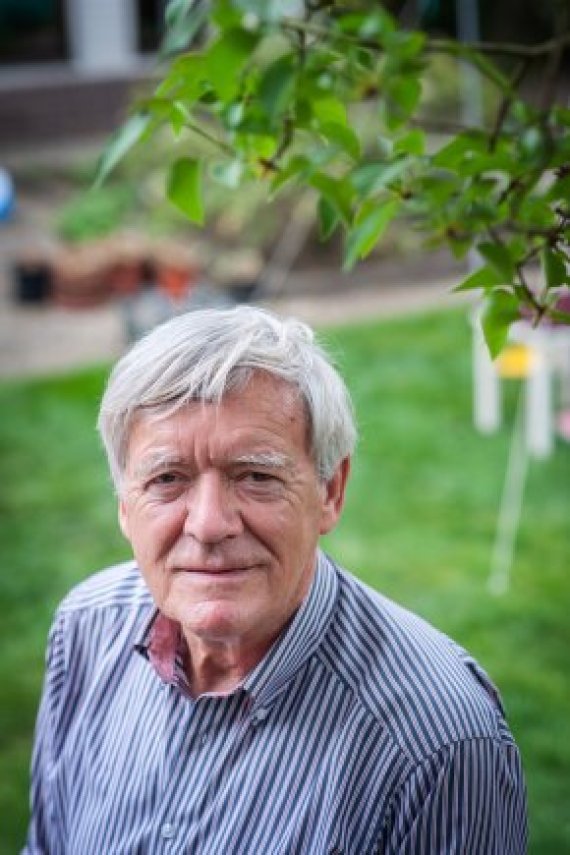text Roelof Kleis photo Guy Ackermans
Last month, Johan Bouma experienced his finest hour at the annual meeting of the International Union of Soil Sciences in Rio. The Wageningen emeritus professor received the Dokuchaev Award, named after the Russian Vasily Dokuchaev, who laid the foundations for soil science. Soil scientists see this award as the Nobel Prize of their profession. Just last year, the European Geosciences Union awarded Bouma the prestigious Alexander von Humboldt Medal. And the year before that, he was given the President’s Award by the Soil Science Society of America.
When asked, Bouma is quite prepared to show his prizes. It is the day after a special symposium that was organized on campus to honour the prize winner. But that does mean he has to pop upstairs in his house in Rhenen. There is nothing in the living room that refers to the accolades he has received. However, there is a soil profile on the wall, of the land where his children were born in Wisconsin, where he worked for six years after doing his PhD in Wageningen. And a soil profile near the front door of his own place of birth, Vrouwenparochie in Friesland.
What does the Dokuchaev Award mean to you?
‘Well, it’s kind of the end of the journey. I’m about to turn 78. But of course it’s nice to get it. Although I want to emphasize that it’s our medal, not my medal. We did the work as a group. That may sound a bit soft but it is true and I mean it too. We should be proud of ourselves as Wageningen scientists.’
There is more interest than ever in soil. Why is that?
‘It’s becoming increasingly clear that you can’t ignore the soil. There has always been a lot of research on plants and water but what matters is the entire system of soil, plants, water and atmosphere. One third of the world’s soil is severely degraded and that has a negative effect on the whole system. That’s a major problem.’
We need to apply the existing knowledge first before embarking on new research
Is that because of a lack of knowledge?
‘No, in many cases we know quite well what we should be doing. Take erosion, which we have been researching for a century. We have the knowledge of how to combat erosion but it isn’t being applied. Which doesn’t mean we don’t need more research, because the web of life is incredibly complex. So far in the past 100 years, we have only scraped away and studied a thin outer layer. Very successfully, it should be said: we certainly don’t need to be ashamed of what we’ve achieved. But we need to apply the existing knowledge first before we embark on new research.’
What does that mean for Wageningen?
‘The research culture needs to change. At present, the approach is often linear: there is a question, money is spent doing research, and this produces a solution. But you can’t achieve the UN’s sustainability goals through individual disciplines. The system of soil, plants, water and atmosphere requires more collaboration with other disciplines. It is also really important to get the stakeholders involved in the entire process. It’s not about us solving their problem, it’s our joint problem that we need to jointly research in the knowledge that there are no direct solutions.’
The efforts by WUR units to collaborate more as One Wageningen aren’t enough?
‘One Wageningen is a good idea but it is mainly geared to internal cooperation. But you can achieve that most effectively by going out into the field and tackling problems jointly with stakeholders. Stakeholders have become assertive and there are no simple solutions for sustainable development goals. What we should do is offer a potential course of action. Anything is possible in theory but we must say what the consequences are for the economy, society and the environment. Then people can make choices. That keeps the process transparent. Currently, decision-making is too often a question of backroom deals and bargaining.’
Can this be combined with the standard PhD project?
‘Interdisciplinary research and talking to stakeholders and farmers costs loads of time. Researchers don’t have that kind of time. Especially not PhD students, who have to produce their articles in four years under the current regime. Researchers should be given more time to reflect on matters. Wageningen is thriving and I’m proud of that, but looking to the future, I say we should watch out that we don’t overdo it.’
You are still active in your field, with regular publications. Will the work never stop?
As a scientist, you have a shelf life and you need to be very aware of that. But I have a lot of contacts abroad and I’m often asked to give keynote speeches. So it would appear I still have something to say. But that’s mainly about how we should act as a discipline in the broader context, on how to tackle interdisciplinary research and collaboration with partners in society. I definitely don’t keep up with the details of what’s happening in my discipline any more. That’s for the next generation.’
Geoderma honours Bouma
At the end of the year, the scientific journal Geoderma will be publishing a Festschrift (celebratory special issue) to mark the important soil science prizes that emeritus professor Johan Bouma recently received. The celebratory issue will contain papers by former PhD students of Bouma on their recent research. They include Wageningen professors Coen Ritsema, Arnold Bregt and Jan-Willem van Groenigen, the current chairing editor-in-chief of Geoderma. The topics range from sampling methods for digital soil mapping to an analysis of the suitability of soils in sub-Saharan Africa for rice production.

